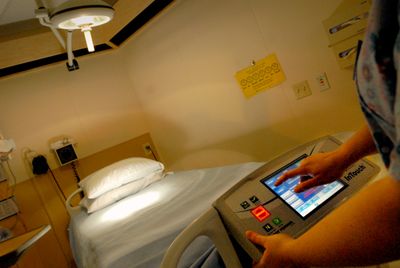Smart beds improve care of KMC patients, nurses

If you try to get out of bed when you shouldn’t in Kootenai Medical Center’s intensive care units, your bed just might speak up.
“Please stay in bed,” is one of dozens of voice commands the 12 new Stryker “smart beds” will issue in as many as 14 languages, depending on a patient’s nationality. The beds’ repertoire includes dozens of commands and patient care questions issued in languages including French, Spanish and German, but also Russian, Mandarin and Arabic.
Imagine a hospital bed saying:
“Are you hungry?” in Cantonese.
“Do not pull on your tubes,” in Vietnamese.
“Please squeeze my hand,” in Polish.
The questions all require either reactions or yes or no answers, rather than responses that nurses might not understand.
Novelty aside, nurses in the intensive care unit say the foreign language capability is not the beds’ most important feature, as relatively few non-English speaking patients come to the hospital. They do, however, anticipate using the Russian language feature due to the large population in the Spokane area.
And, said Janeen Berrier, unit supervisor: “It only takes one or two to be frustrating when you can’t communicate with them.”
Instead, nurses say, the beds are worth their $25,500 price tags in the savings they’ll create in patient safety and easing of workload. Due to their automation, features and technologically advanced mattresses, the beds assist nurses in monitoring the most critically ill patients and allow one nurse to do things that previously required two, such as weighing or transporting people.
“With the nursing shortage and an aging workforce, anything we can do to keep nurses at the bedside one year longer” helps, said Tamara Rochlin, a critical care resource nurse for KMC. In addition to the patient assistance, she said, “I felt this was a huge investment in us.”
The smart beds are part of a $3.8 million renovation to develop a coronary intensive care unit to relieve some of the pressure on the regular intensive care unit, said hospital spokeswoman Kim Anderson. The upgrade will add to the hospital’s ability to care for patients with intensive care needs, she said. Among each unit’s beds will be six smart beds, which primarily are designed to assist in caring for patients with serious heart and lung problems.
The beds’ sensors can monitor a heart rate. Mattresses can deliver pulsations to patients who need pulmonary treatment or vary pressurization to reduce the likelihood of bed sores. With the touch of a button, the beds can rotate a patient from side to side or into a full sitting position for ventilation.
Sacred Heart and Deaconess medical centers in Spokane do not have smart beds but do have beds with some, not all, similar features, spokespeople said. Anderson said the funding for the KMC beds came from the Kootenai Health Foundation, whose biggest fundraiser, the Festival of Trees, raised $423,000 last year.
Nurses appreciate the bed features that they say will cut down on repetitive stress injuries. They include side rails that are easily raised with one hand and without bending; motorization, which allows the beds to be used as gurneys with one nurse, not two, transporting patients for testing; and a built-in scale that enables the bed to regularly weigh patients and keep a history of weight fluctuations.
The bed can be programmed to deliver a wide array of instructions, including telling people to stay in bed if the sensors detect them trying to get up. Built-in lights and noises also alert nurses if pre-programmed requirements change, such as a 30-degree incline propping up a patient’s head to ease breathing. Rochlin said visitors sometimes try to change settings necessary for care, believing they’re helping make their loved one more comfortable.
“I think it’s going to massively help with patient safety and falls,” Rochlin said.